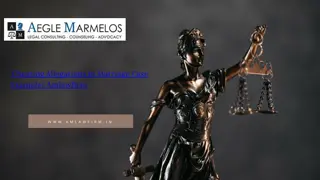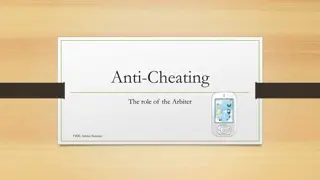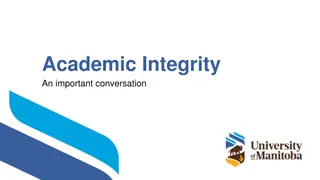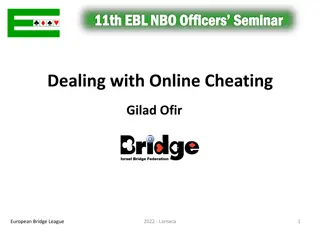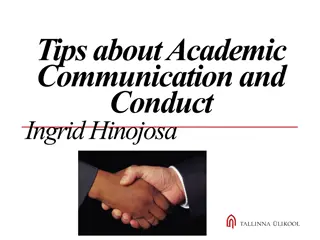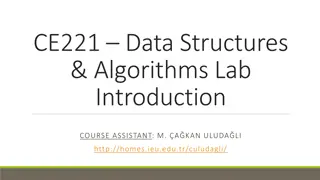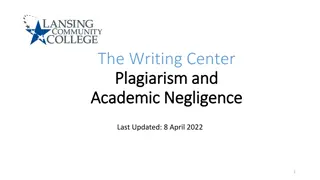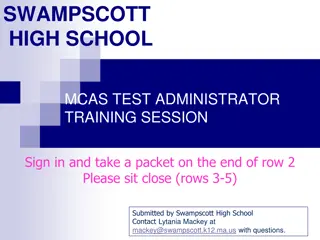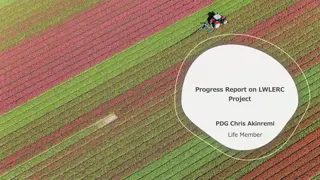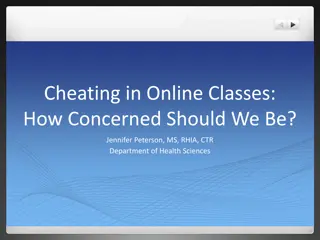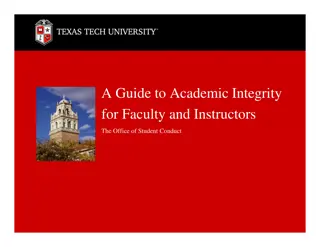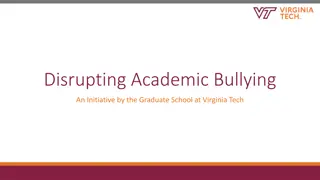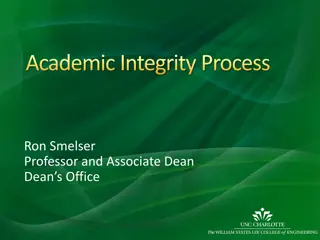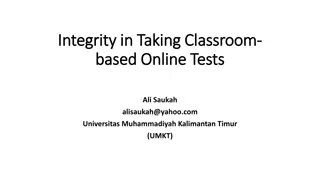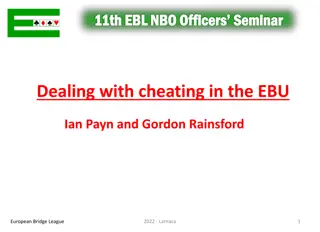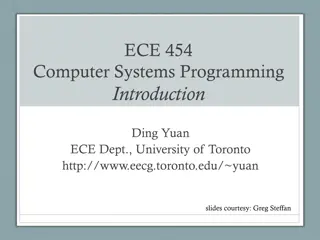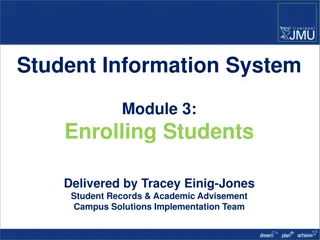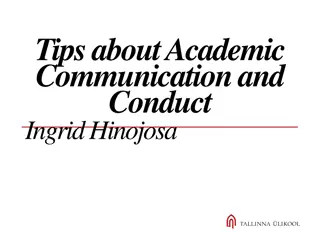Unwrapping Cheating in Academic Settings
Explore the nuances of cheating in academic environments, addressing assessment irregularities, academic integrity, and the importance of upholding ethical standards. Learn what constitutes cheating, the various forms it can take, and the potential consequences for students. Discover ways to prevent cheating and seek assistance when under pressure, ultimately promoting a culture of academic honesty.
Download Presentation

Please find below an Image/Link to download the presentation.
The content on the website is provided AS IS for your information and personal use only. It may not be sold, licensed, or shared on other websites without obtaining consent from the author.If you encounter any issues during the download, it is possible that the publisher has removed the file from their server.
You are allowed to download the files provided on this website for personal or commercial use, subject to the condition that they are used lawfully. All files are the property of their respective owners.
The content on the website is provided AS IS for your information and personal use only. It may not be sold, licensed, or shared on other websites without obtaining consent from the author.
E N D
Presentation Transcript
CHEATING UNWRAPPED PROFESSOR EMMA BAKER, PROFESSOR IAIN GREENWOOD COURSE CO-DIRECTORS, BSC IN CLINICAL PHARMACOLOGY
WHY UNWRAP? We have been tip-toeing around this too long Empathic staff/ pandemic situation/ data protection Terminology is unclear Assessment irregularities , academic integrity Regulations are buried Obscured by other information e.g. long documents, induction Some students are cheating and this needs to stop
OVERVIEW By the end of this lecture students should be able to: 1.Explain what counts as cheating 2.Describe ways in which it is OK to work together 3.List reasons not to cheat and describe some of the penalties the university may impose on students found to be cheating 4.Identify sources of help that can reduce the pressure to cheat
OVERVIEW By the end of this lecture students should be able to: 1.Explain what counts as cheating 2.Describe ways in which it is OK to work together 3.List reasons not to cheat and describe some of the penalties the university may impose on students found to be cheating 4.Identify sources of help that can reduce the pressure to cheat
WHAT COUNTS AS CHEATING? Anything directly related to an assessment where a student tries to gain an unfair advantage These are called assessment offences but for avoidance of doubt throughout we will refer to them as cheating
WHAT IS CHEATING? Accessing resources during quizzes and exams Using books, notes, electronic documents, internet resources or any other aids during exams unless expressly allowed by the examiner Copying and collusion Copying the work of other students on the course, allowing someone to copy your work, working together on an assessment/assignment without permission Plagiarism Presenting the work of another person as your own without acknowledgement of the source Anything else that feels wrong If in doubt don t do it or check with your course team
WHO IS CHEATING? Students A and B are doing an assignment that student B doesn t understand Student A lends student B their completed assignment and student B submits a copy with a few words changed? Student C tells their friend student D that she is worried about failing an online exam Student D agrees to do the exam at the same time as student C so they can cross-check some of the answers by Whatsapp Student E finds a way to look at notes during online assessments that he thinks is not visible to the examiners Students E and F use this method to help them get better marks in weekly quizzes
WHO IS CHEATING? Students who benefit unfairly in any way during an assessment Students who incite others to cheat e.g. sharing tips on how to avoid detection Students who help other students to gain an UNFAIR advantage during an assessment
THE REASON IS NO EXCUSE Didn t realise THAT was cheating Evil masterplan for world domination Family problems can t make deadline Really want to help my friend Worried about money need a part time job Fell behind with COVID, can t catch up Just can t understand what I am supposed to do Won t hurt we work together anyway Gotta get good marks for internship application Too depressed to do it myself
OVERVIEW By the end of this lecture students should be able to: 1.Explain what counts as cheating 2.Describe ways in which it is OK to work together 3.List reasons not to cheat and describe some of the penalties the university may impose on students found to be cheating 4.Identify sources of help that can reduce the pressure to cheat
BLURRY LINES IT IS OK TO BUT NOT WHEN THIS IS ASSESSED Live quizzes and exams Do not communicate with each other in any way during these Assignments These must be all your own work Research and analysis Outline/structure Writing and reporting Study together Discuss ideas Test each other Share/signpost learning resources Show each other how to do things e.g. data analysis, formatting documents Talk about how to do assignments e.g. discuss the marking rubric Write papers/talks together where these are NOT individually assessed
IF YOU. Don t understand something Don t know how to do an assignment Are worried about missing deadlines/ failing Want/ need to get better marks Or anything else that is making you think about cheating Your course team is here to help Academic help - topic teacher/ module lead emails, discussion boards Pastoral issues - personal tutor/ course administrator/ course leaders University Academic help Academic Success Centre: Study+ (sgul.ac.uk) Email: AS@sgul.ac.uk Disability Information for Students (sgul.ac.uk) Email: disability@sgul.ac.uk
OVERVIEW By the end of this lecture students should be able to: 1.Explain what counts as cheating 2.Describe ways in which it is OK to work together 3.List reasons not to cheat and describe some of the penalties the university may impose on students found to be cheating 4.Identify sources of help that can reduce the pressure to cheat
SOME REASONS NOT TO CHEAT It is better not to For yourself, the integrity of your degree and the university You will disappoint your lecturers and course team It will probably catch you out At the time, later in the course, academic record, sleepless nights It wastes a lot of time and energy
EXPLODING MYTHS They don t care We do They ll never catch me We have a good chance Canvas/ browser information Patterns in submitted work (you are a small course) e.g. Students with similar answers (exams - statistical analysis) Turnitin scores Unexplained changes in performance by students Observation and word of mouth Formal investigation by conduct and compliance team Nothing will happen It could
CAUTIONARY TALE 1 Two friends (students Q and R) were preparing for an assessed oral presentation Student R wasn t sure what topic to pick so chose the same topic as student Q The students researched their work independently and produced two completely different presentations, which they each presented in their own style Outcome The students both got good marks for their work
CAUTIONARY TALE 2 Turnitin analysis showed marked similarities between lab reports submitted by students G and H The course team contacted the students who admitted that student G had helped student H who was struggling Penalty The course team advised the students not to do this again and capped their marks for that assignment at the pass mark of 40% The module lead and personal tutor contacted student G to see what extra academic and pastoral help was needed to address their struggles
CAUTIONARY TALE 3 Statistical analysis of answers indicated that students S, T, U and V may have colluded during an online assessment The students were referred to the Conduct and Compliance team for investigation The students admitted collusion and apologised unreservedly Penalty Marks for the assessment were cancelled and a resit was required, capped at 40% As the students admitted the offence, it was not noted on their academic record
CAUTIONARY TALE 4 Statistical analysis indicated that students N, O and P may have colluded during an online assessment The students were referred to the Conduct and Compliance team for investigation The students denied collusion, but an investigation found that they had colluded Penalties Marks for the assessment were cancelled and a resit was required, capped at 40% A formal written admonishment and warning about future conduct were put on the students St George s files There was a requirement that students should declare these penalties when asked if applying for future healthcare courses
OVERVIEW By the end of this lecture students should be able to: 1.Explain what counts as cheating 2.Describe ways in which it is OK to work together 3.List reasons not to cheat and describe some of the penalties the university may impose on students found to be cheating 4.Identify sources of help that can reduce the pressure to cheat
WHAT THIS MEANS FOR YOU Don t be tempted to cheat If you are struggling seek help If you are not struggling, you don t need to cheat Don t be tempted to give other students direct help with assessments Work together but don t cross the line Don t let yourself be pressured - your course team is here to help If you cheat don t compound the offence If you have got away with it so far, stop now If caught, be honest, even if it seems impossible or others are involved
REMEMBER IF YOU. Don t understand something Don t know how to do an assignment Are worried about missing deadlines/ failing Want/ need to get better marks Or anything else that is making you think about cheating Your course team is here to help Academic help - topic teacher/ module lead emails, discussion boards Pastoral issues - personal tutor/ course administrator/ course leaders University Academic help Academic Success Centre: Study+ (sgul.ac.uk) Email: AS@sgul.ac.uk Disability Information for Students (sgul.ac.uk) Email: disability@sgul.ac.uk
OVERVIEW By the end of this lecture students should be able to: 1.Explain what counts as cheating 2.Describe ways in which it is OK to work together 3.List reasons not to cheat and describe some of the penalties the university may impose on students found to be cheating 4.Identify sources of help that can reduce the pressure to cheat
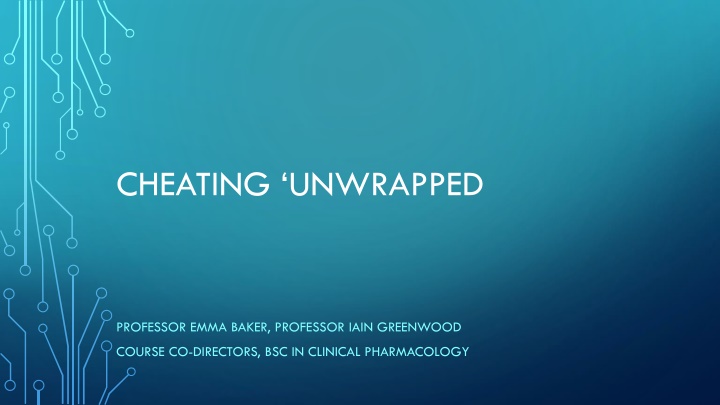

![❤Book⚡[PDF]✔ Fool Me Once: Should I Take Back My Cheating Husband?](/thumb/20473/book-pdf-fool-me-once-should-i-take-back-my-cheating-husband.jpg)

